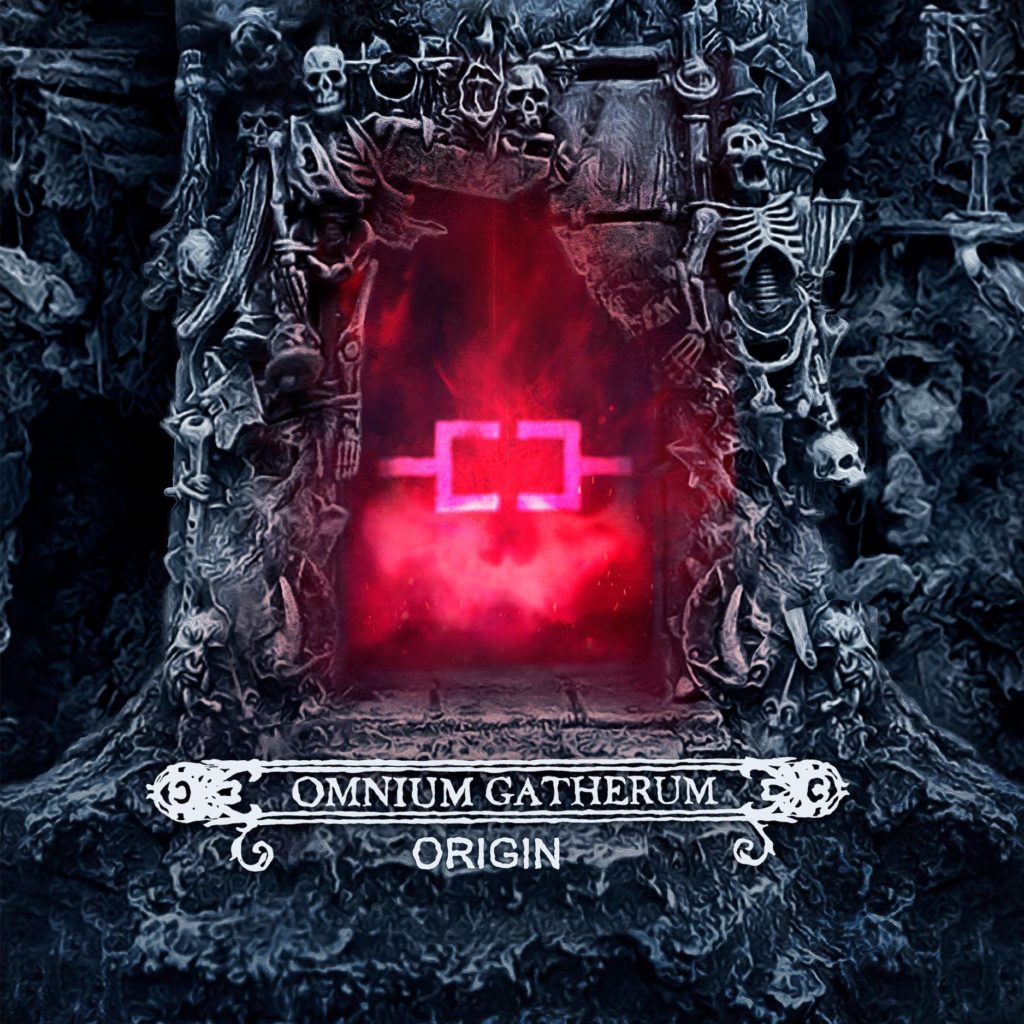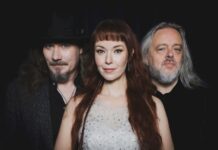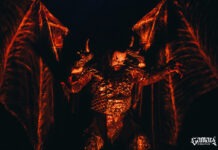This year, OMNIUM GATHERUM are back with a brand new album “Origin,” so we got in touch with Markus Vanhala and Jukka Pelkonen to talk about it. We also used this opportunity to delve into the band’s history and legacy. Read the whole interview below:
Hello and thank you for doing this interview! How are you doing and how have you been doing these past few months?
Jukka: Hello! I am good, thank you. These past months have been pretty busy with some touring in Finland at last. And of course the release of “Origin” has kept us busy too. Otherwise, nothing much, but just basic stuff.
Markus: Hi y’all, okay-ish and fine. Been hanging a lot at home, for some strange reason. Just doing a lot of music and waiting for the live field to be unleashed again so we can escape and promote “Origin” in shows all over the world.
OMNIUM GATHERUM have released nine albums in your 25-years-long career. With such a long career, the band has certainly gone through ups and downs. What was the best and worst phase of the band?
Markus: We’ve been having a long road for sure, but this band has offered experiences and adventures for a few lifetimes, so it’s been a wild ride and I’ve been enjoying it with a full heart. The first times are usually the most memorable times, like first demo, first record deal, first album, first concert, first trip abroad, first trip to US or Japan or Australia, etc. But our road has always read upwards, even if sometimes very slowly, but still. So we haven’t gotten our success overnight, which means we can really value all we have reached with our hard work, indeed. Losing some members on the road of this journey sometimes has been really painful and has made us think if there’s any purpose for this, but in the end, it’s always been for the better. Change is just one letter away from a chance, which is a better word, I think. At the moment we have a really strong lineup and fellowship in this band, so it’s all been worth the ride!
Thinking back to your debut, what were those early days like for the band? Were you well accepted? Did you see a lot of doors opening for you?
Markus: Crazy days, almost 20 years ago, huh. Well, somehow OMNIUM GATHERUM has got better reception and has always been bigger outside Finland. In our home country we’ve always been some kind of underdogs in the metal scene, and somehow still are, but to be honest we couldn’t care less. More or less it’s partly because we’ve always been signed to international labels, not Finnish, so we didn’t get “the local hype” ever. Especially with the debut album back in 2003, so many critics in Finland were laughing and judging us, but then we got some top ratings and big stories in the international press. So with that album, the doors opened abroad and we’re still on that same crusade.
There are many bands in the north (Finland and Sweden especially) that play some sort of variation on the melodic death metal formula. How easy (or hard) is it in such a competitive music market to find your own place as a band and to build up a fan base? What did it take for OMNIUM GATHERUM to stand out from the crowd?
Jukka: Yes, there indeed are a lot of bands creating music for the melodic death metal genre. And yes there is a lot of competition between different groups. This is, of course, a natural thing and I think a little healthy competition never hurt anyone. With persistence, a tiny bit of luck, and plain hard work, I think it is possible to build a decent career in this genre. OG’s music is always thriving to renew itself, yet not going too far from our sound. We also try to contribute something fresh to the whole genre with each album. Our fans have noticed this over the years and the upward spiral of our new listeners also contributes to the fact that there is “a calling” for our music. For these reasons, I can say OG has found its place and discovered new territory at the same time in the genre. As long as we have made music with OG, we have realized that when a band establishes a certain status within the genre, it has to continue to do the work because the competition is still there and there are new bands appearing on the stage constantly. OG has faced its share of challenges and storms along the way, so it has not been easy by many standards, yet this is also one of the things that has kept us hungry and humble at the same time.
You’ve come a long way since your debut, but how do you feel about the current status of the band? Do you feel as though the band has “made it” or do you still think there’s a lot of work to do?
Jukka: Yes, we have. It’s been a long road and a rocky one at times but still well worth the walk. The “plan” that OG follows is to take things one at a time in a sense and build up our campaign record by record in a way that this lifestyle is still of interest to us. This also includes the extensive touring we have done at the same time. These two come together naturally because after each album release, there is always touring to be done. We like both sides of the coin, so making new music and then playing it to the crowds is always a huge pleasure to us. This includes, of course, all the challenges both things carry with themselves. When it comes to the status of the band, I think it is something that is acquired with a lot of work and persistent belief in that work. Still, the whole concept of status is a changing one. I believe it relates to the activity of the group in general. About the topic of “making it,” I think in a lot of ways, yes, we have but at the same time, there are still many things to be achieved and challenges alike.
From your first album to now, would you say each album is a representation of the band at that time or is music more like a form of escapism for you?
Jukka: It is clear that each album is a representation of its time and still it connects with the albums that preceded it. I think it is a thing that cannot be avoided, because in this instance, we are following the specific pattern… may it wary from time to time. Also, we try to make this music for our listeners too and I think they appreciate a certain continuity in our music. Yet there is the artistic perspective to this. I mean, the art that we create is “larger than life” in a sense it transcends us in a lot of ways. For example, it is a cooperation of many people, so there is no one creator. Secondly, we get inspired by the ideas we are brainstorming and the suggestions we make to each other can create interesting arrangements for the songs. Music lives its own life and goes on to do so despite the fact that we think we are always in control. The true purpose of musical secrets continues to escape the musician and yet it still manages to inspire one again and again. So there indeed is a form of escapism involved.
The band has undergone a number of lineup changes over the years, including a recent shift. Do you think this lack of stability affected the band’s artistic growth in any way, or, on the contrary, did it lead the band down new and adventurous musical paths?
Jukka: Yes, the lineup changes have been many during the years. It is one of the constant things we have [wink]. The instability it has created has always worked in our favor in the end. When we have had to go through so many lineup changes, it really has made us stronger musically. We have kept our sound intact, refined it, and been able to keep it from straying too far from the genre and that has kept us on our toes in a very good way. We have realized that OG is bigger than the sum of its parts. Of course, emotionally speaking, it is sometimes rather hard and sad even to say goodbye to a colleague who has also become one’s friend over the years. We have had both dramatic and non-dramatic departures of members in OG and in both cases, like I said before, it has made us more whole in the end. There is no way to say how things might have been, were there not so many lineup changes, but I think that kind of speculation is quite the waste of time when it is not done in a reminiscing way.
“Origin” is the first release with a new lineup. What did the newcomers bring to the table, and how well did they integrate into the band?
Markus: As I said before, change isn’t always a bad thing and is one letter away from the word “chance.” This time the newcomers, Mikko Kivistö and Atte Personen, brought to the table, at first point, an outstanding rhythmic duo that really kicks your balls, but secondly, a new fresh young hungry attitude that gives us older members a new boost. Old tired blood out, and young fresh in. During all this pandemic bullshit, we’ve had more time as a band to hang out and rehearse than we’ve had for previous years and years, so the good thing was that it got the new guys in very fast. With Atte we, in fact, cheated him a bit… he was mostly an unfamiliar dude to us, but we hung out in his town and randomly asked him to party with us at the pub, and it was an epic night test that he succeeded. At the end of the night, we said that we need a drummer and he was blown [away].
What is interesting about “Origin” is that you have been promoting it as a melodic death metal version of DEF LEPPARD’s classic “Hysteria.” Walk me through your thought process regarding this musical direction. Where did the idea of incorporating AOR elements into melodeath come from, originally?
Markus: It has snuck in slowly and suspiciously, but naturally. It’s a natural combination of musical things that we love. Death and DEF LEPPARD, death Leppard. The piña colada of death metal, the things that everyone loves but randomly praises ’em in public [laughs].
When you look at these new songs, do you see similarities and differences between them?
Jukka: The songs have both these qualities. They do work really well as individual songs but the continuity of the whole album is deeply thought through. There are similarities of course between the songs, just as there are similarities to the older songs from previous albums. The differences are seen because we try to make the kind of songs that have little “hooks” here and there both in the composing and lyrically. Still, the fact remains that OG is a melodic death metal band so the songs are melodic death metal. This is really important to us because we want to make this kind of music and not wander too far from the original idea of the genre.
Some of my favorite tracks from the album are “Fortitude” and “Tempest.” What can you tell me about these two, especially from a lyrical standpoint?
Jukka: Lyrically “Fortitude” is about the massive strength one must build up to face the results of the risks taken or not taken in the past. With this, I mean the ability to understand each moment as a possibility containing both the negative and positive potential. It is about the seemingly endless cycle of choices and reactions to the decisions that are made constantly. “Fortitude” is a story about the weight of these decisions and all kinds of consequences they appear to conjure up. One must be bold and really have the mindset to have fortitude, to be able to rise so far up and gain the perspective of oneself.
“Tempest,” on the other hand, is about all of the voices one has inside and the make-believe “war” they seem constantly to be engaged in. This struggle is fueled by the ambitions one gives to each need. Whether these needs are born from an outside influence or not is beside the point. The fact they exist is proof that they must be addressed whether or not any progress is made. “Tempest” is about the ongoing lust and what this lust can do to an individual if it builds up to sizes hard to measure. It is also about the roots of emotions that give a possibility to these voices to manifest.
The press release states that the lyrics are about a person’s inner self and the studies of the origin of the mind. Did you already have the ideas in your mind before putting pen to paper or did the concept come to fruition as you were writing the songs?
Jukka: I did have ideas and a proto concept in the works before the writing process began. I have a lot of material and ideas in general written down. Usually, when a thought, a phrase, or a certain concept comes to mind I write it down. So there is an abundance of raw material gathered through years from which to get inspiration and thought patterns. After each release of the album, there is a period of time when it feels like there are no “new” ideas from which to proceed to the next album concept. Here there are two things that start to influence the process. Firstly, the before mentioned raw material. And secondly, fresh concepts start to appear and ideas begin to take form. This is fueled by the fact that usually about the same time there starts to be early demos of the new songs. So in reality it is kind of like both these things are happening intermingled. It would be really difficult, at least for me, to try to separate these things from each other. In my opinion, it is the continuity they need and also what I need as a lyricist to have a new perspective on the writing process.
The band was formed in 1996, and it is still going strong. Whenever you decide to retire, what do you want your fans to remember most about the band’s legacy?
Markus: The music and the energetic sweaty live shows. We would be happy to be remembered for the originality of the music, and as a band that walked its own path, kept its own mind, and never decided to step to the “easier routes.”
Speaking of legacies, “New World Shadows” is considered to be one of the best melodic death metal albums in Finnish metal. In retrospect, what are your thoughts about this record?
Jukka: Thank you. When looking back at “New World Shadows” I must say it is the album that got us really inside the metal genre. Back then we got the whole touring thing really going and realized that this is the sound we wanted to build on in the future. It was the most melodic and epic album we had made so far and its legacy can be heard even on “Origin.” “New World Shadows” opened many doors for us both career-wise and musically. The amount of shows we did both in Finland and in the world after the album was the most we had done so far, so we really hammered our band’s name to people’s minds. I enjoy the songs in “New World Shadows” still today and wish we can add more songs from it to our future setlists. 2021 is also the 10th anniversary of “New World Shadows” and the album has stood against the sands of time quite well.
Markus: “New World Shadows” was made under the kind of all-in mentality, one more for the road. We had some critical lineup changes back then and label changes too, so this album was composed in a weird turbulent state but without any stress. Wanted to do 200% an album that sounded indeed what OG was meant to be in the first place, and we dropped some of the idle “wanna-be-aggressive” death metal spices and installed some more melodic vibes in its place. Kind of a “let’s see one last time if anyone gets our point,” and gladly many got the point on that one!
What are some of your favorite songs throughout your whole discography?
Jukka: “The Pit” from “Grey Heavens,” “Nova Flame” from “New World Shadows,” “Chameleon Skin” from “The Redshift,” and “Tempest” from “Origin.” There are many others but these came to mind first, of all the favorites.
Markus: “White Palace” from “Beyond,” “Solemn” from “Origin,” “Deep Cold” from “New Worlds Shadows”; I like those epic long songs a lot. But also those bangers like “Over the Battlefield” and “Frontiers” and “Reckoning” and “Rest In Your Heart” etc. The answer to this question varies from day to day, as they’re all our babies…
You have toured with some great names in the business like DARK TRANQUILLITY, NILE, SWALLOW THE SUN, INSOMNIUM, ROTTING CHRIST, CALIBAN, and ENTOMBED. What did you learn from them?
Markus: The band we’ve toured probably the most is DARK TRANQUILLITY, since 2008, and they’ve taught us a lot of “the school of rock” and “codes of the road.”
What was your favorite concert and what was your worst concert? What was the best venue that you ever played at? What about the strangest venue?
Jukka: There have been many great gigs and a couple of not-so-great ones. One of the best shows in my opinion was when we played the House of Rock in Hollywood, CA. The venue was awesome, the staff was professional, and both the band and the crowd were on fire! That night everything just came together and it really could be felt in the whole atmosphere. That show goes on my top-five OG shows of all time. For the worst shows, it is really hard to say because fortunately there have been only a few of those. In these cases, I can say a show is not good when one is too hungover (this shit happens rarely nowadays, though) [laughs], when the monitoring in the venue is shit and one cannot hear all the instruments clearly enough, or there are technical issues after technical issues.
When it comes to venues, there have been a lot of awesome places. It is hard to name one specific. Usually, the venue is alright when the basic needs are met. A decent sized stage, professional local crew, and good food. That basically is it. The strangest venue we have played in was in Serbia, in my opinion. In the daytime, it was a gun club. Literally. At night it turned into a live venue but it still had the target boards in the back of the stage! [laughs] Also, we were thrown out after the show into the cold, cold night which was pretty strange because there were still many hours until our bus could come and pick us up from the venue.
Markus: Probably my all-time favorite shows have been played in Tokyo, there’s always magic in the air, and the crowd is phenomenal. Last tour we played 2 sold-out headlining shows in Tokyo but I still cherish the memory from 2013 when we played the huge Studio Coast venue in Tokyo when we supported NIGHTWISH there. Probably my all-time favorite cities are Tokyo, Montreal, and Paris, always wildest crowds for us! And yeah, the Serbia and Gun Club in Belgrade was probably the weirdest venue, though the crowd was great. But before the soundcheck there were police squad training on the gun shooting range, that was in fact the stage…
While on the subject of tours, you have recently announced a North American tour with ALLEGAEON and BLACK CROWN INITIATE for early 2022. What can you tell us about this tour?
Markus: Really looking forward to this adventure, as it’ll be (hopefully) the first post-pandemic tour happening and it’ll be the first OG HEADLINING tour in the US, after five support tours we’ve been doing there and building up the hype. Super cool bands as support too with ALLEGAEON and BCI. It’s a really positive surprise for fans that this tour might even happen now after all this bullshit!
Do you have anything else you want to share with our readers?
Jukka: Enjoy “Origin” and come have some beers with us on the road!
Markus: Keep the spirits high and never surrender, see ya on the road soon-ish!







